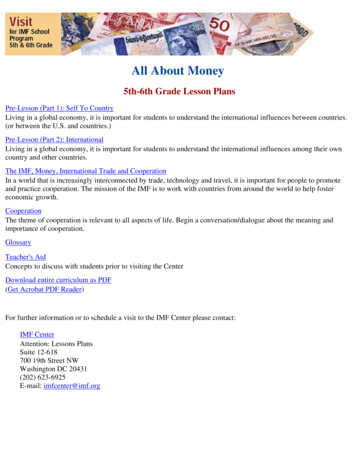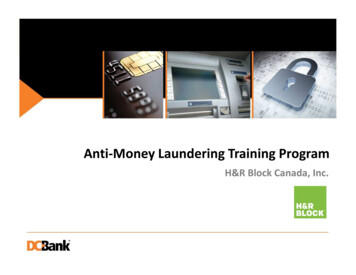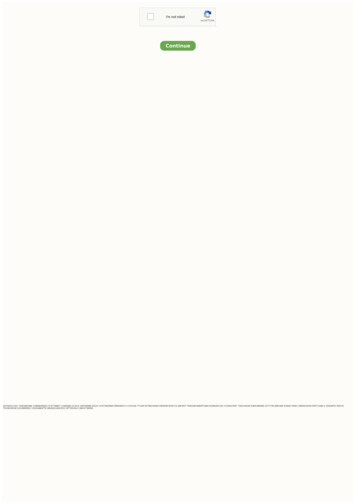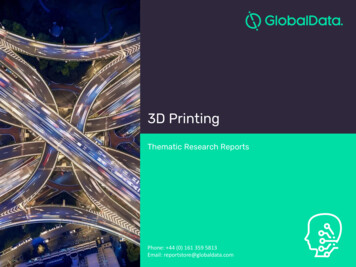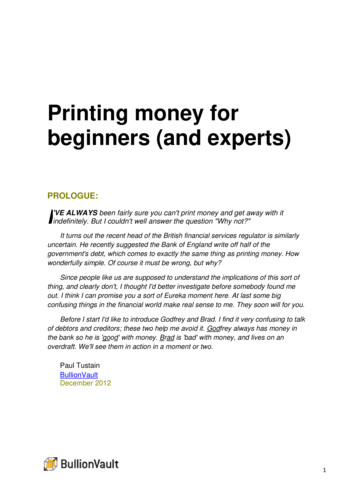
Transcription
Printing money forbeginners (and experts)PROLOGUE:I'VE ALWAYS been fairly sure you can't print money and get away with itindefinitely. But I couldn't well answer the question "Why not?"It turns out the recent head of the British financial services regulator is similarlyuncertain. He recently suggested the Bank of England write off half of thegovernment's debt, which comes to exactly the same thing as printing money. Howwonderfully simple. Of course it must be wrong, but why?Since people like us are supposed to understand the implications of this sort ofthing, and clearly don't, I thought I'd better investigate before somebody found meout. I think I can promise you a sort of Eureka moment here. At last some bigconfusing things in the financial world make real sense to me. They soon will for you.Before I start I'd like to introduce Godfrey and Brad. I find it very confusing to talkof debtors and creditors; these two help me avoid it. Godfrey always has money inthe bank so he is 'good' with money. Brad is 'bad' with money, and lives on anoverdraft. We'll see them in action in a moment or two.Paul TustainBullionVaultDecember 20121
Part 1: From credit to money – and back againCHIMPANZEES don't barter, but they trade a variety of delayed favours wewon't go into here.South American vampire bats are more sophisticated, and run a small credit economy.The little darlings have such a need for blood that they lend, borrow and pay back amongstthemselves rather than let a relative go bloodless for a whole night. They somehow manageto do the whole thing without plastic cards.A credit card – of course – is a device which creates both credit and debt, and you canspend the credit bit, which unfortunately leaves the debt bit overhanging, though oddly absentfrom the device's name.Pure, distilled credit usually arises from us doing some work (labour), or transferring ourproperty to someone else (selling goods). Either way, we generate an unreturned favour. SoI'm going to call a unit of credit an 'Uf', and wherever possible I'll use the word 'Uf' instead ofcredit. Somehow it makes it much easier to understand what the hell is going on.Chimps and vampires show that credit occurs naturally, just as it would have for theearliest humans. Beyond the smallest number of transactions it would have quickly becomehard to agree who owed unreturned favours (Ufs) and to whom. Then somebody had thesmart idea of using tokens to represent Ufs.Cash in all its forms is simply physical tokens representing Ufs. The intangible Ufs arethe real thing, the social obligation, and the thing of value. Even a gold coin is a mererepresentation of an Uf. It's an invention which makes the Uf physical, and which helps us tokeep score and to transmit Ufs from one member of society to the next, in a way that we canall understand.After coins were invented, cashless credit never got close to disappearing, although thereare still plenty of people around who think all intangible credit is dishonest trickery andshould be banned. Think of them as "Extreme Gold Bugs" who want a world where merepromises-to-pay are outlawed. I think that's too extreme.If two ancient villagers wished to trade, but lacked cash, could their village eldersprevent them from leaving an Uf outstanding? No – at least not in any society I'm interestedin living in. The elders have no business interfering in the level of trust extended in a privateexchange. In any case, how would the elders know if the two friends carried on with theirbusiness regardless, by simply counting the unreturned favours and remembering them, oreven inventing their own private system of money? The elders' position would be untenableas well as autocratic.Like it or not credit arises automatically from free trade between consenting adults. Ourwish to exchange favours of labour and goods, and to make up our own minds about thepeople we deal with (and how we pay) defeats a cash or gold centric dogma every time.Nevertheless, if we don't use instantly available gold coins then Ufs still need to betracked somehow, and aside from memory there seem to be two remaining mechanisms of2
real importance. The first is printed paper (or printed base metals), and the second isaccounts.Printed paper is much more like gold coins than some Extreme Gold Bugs readilyaccept. Both are tokens which represent Ufs. Both can be possessed, and the spending powerwhich they both confer passes with possession. Neither is made of a material which istangibly useful, but a gold coin's raw material is, at least, reliably scarce, which makes itdifficult for a government to flood the country with new gold money. Yet this is a question ofeffectiveness, not a fundamental difference in what they both are – which is physical tokensrepresenting Ufs.Bank accountsReducing the cherished gold coin to a token of unspent, naturally occurring credit willmake many loyal BullionVault customers splutter with fury, so I apologise unreservedly. Butit is a line of reasoning which seems logical to me, and sets me up well for examiningaccounts, which is what this article is really about. Accounts will help us understand howmoney is being created.Even though we all hate banks we still trust them to do all our Uf record-keeping. Theylet you add Ufs to anyone's account, but allow only you to instruct them to take Ufs awayfrom your account. Another sensible thing they do is let us easily transform Ufs from accountform into token form, and back again, by making withdrawals and deposits of cash. Sorry ifthis is all pretty obvious.A bit less obvious is that, according to a lot of people, banks are able to 'create money'out of thin air using a process called 'Fractional Reserve Banking'. After my introductoryparagraphs, which I hope illustrate how free trade creates Ufs (in many forms) the point ofmy article is to get to the bottom of this mystery.Can banks really just create money?Who creates money?Observers of Fractional Reserve Banking have noticed that your deposit into a bank cancause the bank to offer new loans well above and beyond the size of your deposit. They oftenobject on the grounds that this is new money which shouldn't have been created.But every one of us can easily create spending power in the same way as the vampire.Do a favour for a friend today and your work created an Uf. Even if you didn't write it downyou made a mental note of a social debt, and if your friend returns the favour tomorrow youthen mentally release the favour he owed you. A sort of payment occurred.Vampires bats can't do what we can which is to formalise our simple transaction onto anaccount by booking two payments through the bank. If your friend were to pay you throughthe bank for the original favour you did then you could spend your Uf anywhere. Banking isuseful, like Uf tokens are, because an Uf you earn from your friend, then record at your bank,becomes available for you to pay anyone who's got a bank account.Let's suppose Godfrey has opened a bank account and deposited a few Uf tokens. He cando payment transactions both ways through his account with other people in his city who are3
account holders at his bank. He could go and do a favour for Fred next door – maybe buildhim a garden shed. Fred can tell the bank to pay Godfrey, and the bank puts some negativeUfs into Fred's account and some positive Ufs in Godfrey's. If Fred started with a zero (ornegative) balance of Ufs then with the bank's help they have created money, because Godfreynow has general purpose spending power where none previously existed.Is that necessarily a problem? Maybe not, so long as the bank looks warily at Fred. Canhe be trusted to return an Uf? The bank wouldn't have let his account go negative withoutgood reason. They probably only allowed it because either: They are holding collateral, i.e. control over some of Fred's non-monetary wealth(property) like the deeds to his house, or his share portfolio; or They have information – maybe that Fred's wealthy mother is not long for this world,or that he has just got a job at Goldman Sachs.Scenarios like these give Fred access to Ufs in the future, and credibility at the bank,which responds – occasionally – by letting him run a negative balance of Ufs now.Meanwhile it is the bank's own reserve of Uf tokens which can be given to Godfrey, if heasks to withdraw.Part 2: Bank-to-bank transfersSOMETHING unrelated has happened in the meantime to expand this protobanking system and make it much more useful.Godfrey's bank and the next door city's bank have opened bank accounts with each other.This is a simple response to an economic fact: the citizens of the two cities have started doingtransactions between each other, and there is a demand for payment services between them.Brad lives in the neighbouring city. Having built a first-class shed Godfrey startsadvertising in yellow pages, and soon enough he finds himself building Brad's shed. Whenthe job is finished Brad gives Godfrey a cheque (or nowadays some sort of modern electronicequivalent, but it's easier to understand the process if you analyse it with cheques).The cheque is an authorised instruction from Brad to Brad's bank to post negative Ufs toBrad's account, and to post positive Ufs to whoever presented the cheque. The positive sidecould be to Godfrey's own account (if he banks at the same bank) or to the bank account ofGodfrey's bank.The cheque starts its journey at Godfrey's bank, by being paid in. When Godfreydeposits his cheque, his bank only accepts it because it sees that it's drawn on a bank (Brad's)which they now regularly deal with and which has an account with them. So the bank nowadds positive Ufs to Godfrey's individual account, and takes them away from Brad's bank'saccount. It uses the routing information (Bank Address) printed on the cheque to send it toBrad's bank as an explanation. So it is Godfrey's bank, not Godfrey himself, which deposits4
the cheque which Brad signed at Brad's bank.Brad's bank therefore adds positive Ufs to the bank account it holds for Godfrey's bank,and takes them away from Brad's personal account (which he authorised by his signature onthe cheque). Brad's bank now owes Godfrey's bank some Ufs. They agree (reconcile) onthis point.One bank has a positive, and the other a negative; one bank is owed an Uf, and the otherowes it; one bank has an asset on its books, and the other has a liability1. It is a balance of Ufsto be set off in future against some Ufs flowing the other way when Brad finally gets up offhis ass to do something useful.Godfrey's bank has become a depositor at Brad's bank (or a lender to it, which is thesame thing). It is a sort of aggregate depositor for all the people in Godfrey's city who don'thave an account in Brad's bank, but who have done things for people who do. What everyonehopes and expects will happen is that Brad will do some work for someone in Godfrey's city,then the process will reverse, and the Ufs will switch back. That's what will happen if tradebetween the cities is broadly in balance.But what happens if Brad's city is lazy? Then slowly, Godfrey's bank's books will build alarge positive Uf balance on their account for Brad's bank. Godfrey's bank is owed Ufsbecause there are no favours being returned. Brad's bank's books will show large negativeUfs; that is Ufs owed to Godfrey's bank. That means Godfrey's bank manager could ambleinto Brad's bank and draw its balance down in cash, or write a cheque to move it somewhereelse.Bank managers don't often turn up to each other's main branch demanding a few tens ofmillions in cash to balance out a long period of one-way traffic. They could, but they don'tneed to, because in a modern banking system they are both account holders at the CentralBank, which is basically another bank, but one with a monopoly power to create Uf tokens,and the right to make up new rules for bankers to obey.Nowadays when Godfrey's bank gets edgy about the amount it is owed by Brad's bank, itsimply draws a cheque on its account at Brad's bank, and deposits the cheque in its own1If you bought a small PC accounting package and managed your own personal bookkeeping like a bank, yourpositive balance would match the bank's negative balance. When you had positive Ufs recorded on yourpackage your bookkeeping system would show the bank as DR. They are a debtor, and they owe you money.Meanwhile the bank records its negative Uf balance with you by marking your account as a CR, because youare its creditor. Previously you might (like I did) have thought of CR as a positive Uf balance, which from yourperspective looking at their books it is; but maybe (again like me) you didn't really understand that your bankstatement is a copy of their accounts showing their negative position to you. They record a CR meaning thatthey have a negative balance of Ufs with you. They owe you Ufs. You are their creditor.I was brought up to think a CR balance was good and positive and wholesome. But it's only good if I'mlooking at my account on someone else's books. In fact every bank account is both a positive Uf balance (DR)and a negative Uf balance (CR) somewhere. It depends on whose bookkeeping you are looking at. That's why Ifind it impossible to understand the word "credit" used in the normal way, and have to invent silly words like"Uf" to make sense of it all. Personally I expect most people who go to accounting school think CR meanspositive money, which is probably the main reason there are so many accounting screw-ups in bigcorporations. I'm sorry if this is all very obvious to you.5
account at the Central Bank, thereby converting all its accumulated Ufs held at Brad's bank toUfs held at the Central Bank.This takes Godfrey's bank off-risk with regard to the failure of Brad's bank. Central isacting as – well – a centralised clearer of risk. Indeed any bank which accepts a depositdrawn on another bank and credits the depositor's account is clearing the risk. Once Godfrey'saccount at his own bank is credited he doesn't have to worry if Brad's bank goes bust.Godfrey is now exposed to his own bank's failure, because it cleared his risk. When his bankdeposits its balance at Brad's bank to Central, then it clears away its risk of Brad's bank'sfailure. It is Central which will now be exposed to the failure of Brad's bank.I expect you are now saying to yourself "Is this what the cheque clearing system is allabout?" Alright, maybe you're not, but I'm going to explain it anyway, in one paragraph.You could set up a cheque clearing system simply by starting a bank called 'The ChequeClearing Bank'. You would then open accounts with all the real banks on the high street.Then tell all the members of the system that they can accept deposits to their private accountholders with any cheque drawn on one of the members of your cheque clearing system. Onthe high street bank's books the negative Uf goes to the depositor's private account, thepositive Uf gets posted to the Cheque Clearing Bank's account, and the cheque is sent to yournew 'Cheque Clearing Bank' in explanation, to be routed to the drawing bank, and thence theindividual who wrote the cheque.At each stage of the journey there's a negative Uf and a positive Uf put on the books ofthe bank which receives the cheque, and the boundary between each bank is composed of onebank's negative balance matching another bank's positive balance, which they validate byreconciling each other's bank statement. Banks have entire reconciliations departments doingthis all the time.Okay, I lied – it was two paragraphs. But I have illustrated that however many layers ofbanks, clearers and transfers you set up, and whichever way you look at it, the net failure ofBrad and his neighbours to do anything valuable for anyone else will ultimately lead to a bigbalance of Ufs at an account somewhere. It's the accounting inevitability which follows fromBrad going shopping with the money created by his bank. It also explains that the last bank inthe chain is accepting the risk that Brad's bank can't return the Ufs, and because banks can getoff that risk by drawing a cheque on Brad's bank and depositing it into Central, the Ufscreated by Brad's bank usually end up owed by Brad's bank directly to the Central Bank.These days Central is feeble, and frightened of the political consequences of any bankfailure, so it lets Brad's bank run up an ever growing balance on ever weaker collateral. Otherbanks can deposit any of Brad's bank's junk at Central. Central's bluff (that it might closedown a dodgy bank like Brad's) has been well and truly called. If you are a sound bank youcan now do stupid business with a bad bank which you know can never pay you properly,and it won't hurt you.Because Central's Governor has made it known he won't let banks fail, he has set himselfup as the patsy. Just deposit the large Uf balance which Brad's bank owes you onto Central.The Governor can't stop you doing this while he is determined to turn a blind eye to Brad's6
bank's insolvency. After all you could – instead – go down to Brad's bank and demand yourbalance in cash, which comes from Central anyway. It comes to the same thing, which is toforce the Ufs issued by Brad onto Central, until such time as Central recognises that enoughis enough.You can now see – I hope – that when the economic imperative of shutting a bad bankgets corrupted by politics it positively invites reckless bankers to create money (and to paythemselves absurdly well) and it encourages the good banks to do silly deals with the badones, quickly passing the risk of failure to Central, which becomes a sort of magnet forbanking rottenness. This has been happening all around us in a big way.The resulting huge Uf balances at Central can be made grand and confusing by saying"The Bank of England's Balance Sheet is expanding" which I'm sure makes everyone thinkit's doing a remarkably important job. What it really means is that the Governor won'tdemand that a busted bank pays up or shuts down, so Central just runs up an ever biggerdeposit balance at an ever weaker bank. While Central permits this Brad's bank really isbeing allowed to 'create money out of thin air'.So, to go back to our original question about Fractional Reserve Banking, Brad's bankcan create money and spending power by allowing Brad a negative balance of Ufs. But theintuitive idea that electronic money is easily created simply by adding positive numbers toaccounts is wrong. It cannot be done without being found out by other banks, as Brad'sspending transmits the negative Ufs through the relationships between banks, and ends upleaving Brad's bank owing Central all the money it created.It is only Central's wimpish ambivalence about its giant Uf balance with Brad's bankwhich allows this to happen.Now add collateralI have left something important out of this explanation: collateral. If Brad is sitting onlots of wealth then the whole problem can be rectified. As Brad's account goes steadily morenegative his bank gets more cross, because his negative balance transmits to the rest of thebanking world, making Brad's bank look weak and foolish. That's when Brad's bank takes acharge over his assets, sells them, and eliminates both the negative Uf balance and itsembarrassment with Central.That is very important. Provided Brad and his workshy neighbours can make good theircollective negative Uf balances by selling previously accumulated wealth (but not to eachother) then the Ufs will flow back through the payment accounts in the opposite direction,and balance the deficit at Central. Provided Brad has some assets which are nobody's liability(some 'property') then this can be sold to eliminate his own and his bank's negative Ufbalances.Which means provided there is real property wealth under Brad's overdraft the bankingsystem is safe when his bank creates money. There is nothing intrinsically wrong with a wellsecured negative Uf balance. It just means that Brad's previously untouchable accumulatedproperty wealth has reduced, to be offset by his rising spending power. If his overdraft is wellsecured Brad has decided to put his personal property wealth back to work; and with the7
bank's help he is using his previously accumulated property to create some spending power.Why shouldn't he; and when you invent that wonderful new can-opener why shouldn't you?That illustrates – I hope – the essence of valid collateral in a money system. There's noproblem with creating money on account which is backed by marketable collateral. Butwherever someone somewhere is prepared to turn a blind eye to an increasing default risk,where – for example – the collateral is not marketable, then someone in the system really is'creating money' that shouldn't exist.You agreed with me (didn't you?) that credit creation is the natural consequence of freetrade. The next step has been to accept that it looks perfectly rational that money is created ona bank account, provided that it's underpinned by real marketable collateral wealth.This is simply 're-monetisation'. It converts property (wealth) held outright into acombination of money plus property-held-as-collateral. The overall quantity of wealth doesnot change through this transformation, but the quantity of money does. Before the ExtremeGold Bugs scream "traitor" at me for permitting this money creation let me show you hownormal and uncontroversial this is by doing it in reverse.Godfrey, who owns a house which he puts up as collateral, borrows 10 Ufs from thebank ("Traitor!") to buy materials to make a table. He gets some wood from a timbermerchant, who as it happens currently has an overdraft. Angelina buys the table, with 10 Ufsshe already has.Pouf!! 10 Ufs of Angelina's money have disappeared. Neither Godfrey nor Angelina northe timber merchant now has a positive balance of money. But Angelina has a table as herproperty. Money creation is a two way street of continuous creation and destruction, andthere is nothing to fear when it is underpinned by marketable collateral.So it turns out there is no sensible concept of a fixed quantity of money, although thereshould be a reasonable constancy of unencumbered wealth money. How much wealth isheld as money depends on how much people are willing to surrender their outright propertyto collateralise their money balance. Holding a money balance, as opposed to a propertybalance, is simply a choice to position wealth in a more easily exchangeable form, and banksare places which specialise in that exchangeable form of wealth. There is nothing weird nordishonest about the money which is thus created and it doesn't cause trouble, provided thecollateral is marketable.I feel I can now draw some big conclusions :1. It is pure nonsense to say that a gold standard means all money should be backedby vaulted gold. Suppose it was. It would prevent a man with a paid up 100million property portfolio from borrowing 10,000 from his bank to pay someone 10,000 to build a garden shed. A monetary obstruction to this deal just isn't goingto be tolerated, and it's a stupid idea to suggest the deal should be blocked simplybecause the consumer (rich property owner) or his bank currently has no gold athand. It was precisely this sort of economic blockage that caused people to createmoney in the first place, and if you try to stop willing and credible exchangersfrom using one type of money they'll simply abandon your money, and either use8
someone else's or create their own.2. If the shed-buyer turns out to be a bad Uf generator (Brad?) then when that newlycreated 10,000 spins through the payment system and ends up as a positivebalance of Ufs held by the Central Bank, a polite cough from the Governor willget the balance sorted – in full and without the value of the currency being diluted.Brad's collateral house will be sold. There is no systemic problem while collateralis worth more than the money created.3. I finally get the 'Gold Standard' (which makes me feel very stupid for not getting itbefore). I had read that back in 1910 the Bank of England might only store goldbacking for 15% of the Sterling banknotes it printed. I thought it was cheating, butnow I see it wasn't. The Gold Standard did not require every single banknote, andevery single accounted Pound in every single bank account, to be backed withspecific gold. If that had been the policy there would have been no money for ourrich, property owning shed-buyer, and the gold standard would have beenabandoned in a few days to be replaced by something which allowed wealthypeople to buy things. There's a huge pool of other types of collateral to supportmoney creation. In 1910 English society (then the richest society in the world) wasswimming in wealth assets which weren't necessarily gold. It was sound andreasonable for a bank with no gold to 'create' a spending capability for a successfulindustrial magnate who owned a couple of factories and country mansions. Allthat was required was that the collateral remained more valuable than thestandardised gold equivalent of the money loan.4. The point of the Gold Standard (and it was a good point) was to create a yardstick.It tied money to something real and more-or-less stable, but it did not insist onevery unit of account, and every banknote, being a unique representation of aspecific physical gold stock held by the Central Bank. I was dumb to think it mighthave been like that. I may even have been an Extreme Gold Bug (which is ratherembarrassing). I now accept that paper money is absolutely fine under a goldstandard – and indeed there was plenty of it around when we had a gold standard.5. Becoming merely a normal gold bug again is a bit of a relief. Money is spendablewealth. And because gold is not the only form of wealth which is marketable it isnot the only credible collateral for money creation.6. So we can allow banks to support free trade by creating money (even under a goldstandard). Banks just need to know that if collateral needs to be liquidated they'dbetter be very confident it will raise sufficient money on whatever yardstick isbeing used. Otherwise it's curtains for all their shareholders' equity. Well – itwould be – if their Central Bank wasn't run by a wimp.Is Fractional Reserve Banking the problem?It turns out that Fractional Reserve Banking is not responsible for the bad practice of'creating money'. It is a speed limit on money creation, put in place by a Central Bank to stopbanks doing too much of what comes naturally to them.The Central Bank used to leave lending decisions to bankers, and step in to liquidate9
them when they screwed up. But in a world of Deposit Protection Insurance and bankbailouts, the Central Bank picks up the tab for excessive money creation. To limit the risk,they impose the 'Fractional Reserve' to try to calm the commercial banks down. But it is onlynecessary because we have a timid Central Bank which lacks the gumption to swing its axe inthe direction of banks like Brad's.Indeed the current set up – where banks are not allowed to fail – turns out to be evenworse than I previously thought. It does much more than offer succour to the odd unfortunatebank which steps over the limit of safety. It actually forces banks to be dumb. They have nochoice but to approach the safety limit until they are bound to step over it. Any bank whichdoes not step up to the plate will underperform all the others, and be subsumed by a moreaggressive competitor. It's how evolution works; the survival of the fittest, where fitnessmeans adapted to the prevailing environment. If you do not compete in the skewedenvironment where the Central Bank is a wimp you will expire because of it.That's why banks are forced to make rosy judgments on the value of collateral.Choosing your collateralI am on a bit of a roll now. I think I can see how the Governor's turning a blind eye toBrad's bank's unwise money creation is going to lead to monetary catastrophe, and how it's allgoing to blow up and leave us in a really, really big hole. But we need to understand a bitmore about the way money climbs a pyramid of clearers to see what is happening.Let's see what happens when banks start accepting those sheds which Godfrey built ascollateral for new bank loans.People can now get two uses out of a shed. Sheds are materially more valuable to peoplewho like to use both debt and sheds. Even people who have no garden tools, but who likedebt, can suddenly see how useful a shed really is, even an empty one.So Godfrey is busy building sheds for lots of people like Brad. They owe their bank afortune and the bank believes it is making good profits, because it does not regard the loanscollateralised by sheds as being doubtful or impaired. For the moment they are consideredexcellent collateral to 99% of their market value, and no bank in Brad's city will do anybusiness whatsoever if it refuses to recognise the rock-solid resale value of collateralisedsheds.A bad time to own shedsGodfrey takes on some more employees, and the customers' cheques don't bounce.There's soon going to be a heck of a lot more sheds, and Brad's bank will get a very bignegative Uf balance with Central.Eventually, even with a wimp at the Central Bank, a memo from the Governor to theexuberant bosses of Brad's bank will question the collateralising of yet more sheds. Soonafter that the shed which used to have two uses is once again useful only as a store-room forgarden tools – which makes it intrinsically less valuable. The abundant supply of shedsextends the problem. It will be a very bad time to own sheds.10
That's more-or-less how we got a sub-prime crisis, and all the problems which flowedfrom it2.The expanding balance sheetYou know, I'm starting to get very suspicious of stuff which achieves the bankregulator's seal of approval as tip-top collateral. I mean it's so blinking obvious that as soonas they say "this stuff is rock solid" that bank
smart idea of using tokens to represent Ufs. Cash in all its forms is simply physical tokens representing Ufs. The intangible Ufs are the real thing, the social obligation, and the thing of value. Even a gold coin is a mere representation of an Uf. It's an inv







